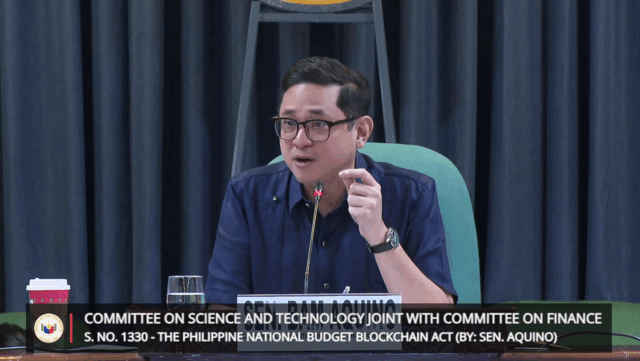Disclaimer: This article is for informational purposes only and does not constitute financial advice. BitPinas has no commercial relationship with any mentioned entity unless otherwise stated.
📬 Get the biggest crypto stories in the Philippines and Southeast Asia every week — subscribe to the BitPinas Newsletter.
The newly-named bill for “CADENA Act” settles the ‘tech-neutral’ debate, adds stiff penalties , and is set for a Nov. 12 sponsorship in the Senate.
Senator Bam Aquino announced at Tuesday’s public hearing that Senate Bill No. 1330 (Previously “Blockchain The Budget” or “National Budget Blockchain Act”) will now be known as the “CADENA Act” or “Citizens’ Access & Disclosure of Expenditures for National Accountability”
“Our goal sa Cadena Act – nakakadena ang budget ng bayan,” Aquino stated, before adding that the mission remains unchanged: making every peso “trackable” and bringing transparency to the national budget.
The hearing, a joint session of the Committee on Science and Technology and the Committee on Finance, finalized key debates and set a clear timeline, with Aquino hoping to pass the law by the first quarter of 2026.
Here are the key takeaways from the session:
The “Tech-Neutral” Debate is Settled

The central conflict of the hearing was the “Blockchain vs. Tech-Neutral” debate.
A number of stakeholders argued for a “tech-neutral” approach. Kenneth Abante of People’s Budget Coalition expressed hesitation that “locking to this tech… might favor certain industry interest and people rather than the end user”.
“We’re hesitant that if we lock to this tech, it might favor certain industry interest and people rather than the end user,” Abante said.
Senator Aquino challenged the premise, asking, “Why not?”.
“I know there’s hesitation,” Aquino said, “but if that’s the tech that fits the standard, why are we [hesitant] to use it… especially right now [when] blockchain seems to be the best possible tech?”.

Aquino ultimately established the bill’s final compromise: the language will remain tech-neutral to be future-proof, but he affirmed that blockchain is the current standard that fits the bill.
DICT USEC David Almirol helped settle the issue, suggesting the group was “overthinking the technicality” and that specific tech choices could be resolved in the Implementing Rules and Regulations (IRR).
What is the “CADENA” Platform?

The “Cadena Act” will establish an official digital platform, “Cadena,” with the following key features:
- The platform will be open-source and must integrate with existing government systems like PhilGEPS and the DICT’s e-Gov app.
- The data will be officially “owned by the Filipino people,” with the DICT acting as the “primary custodian”.
Accountability Council

A new “National Budget and Transparency Accountability Council” (NBTAC) will be created to oversee Cadena’s implementation. It will be co-chaired by the DICT and DBM and include three citizen representatives from CSOs, academe, and the media.
The Bill Has “Teeth”: Stiff Penalties

To combat “garbage in, garbage out,” the bill includes severe criminal penalties for non-compliance.
- Using the “Flood Control scandal” as an example of what Cadena could prevent , Senator Aquino outlined penalties for publishing false information or failing to upload required data within 30 days.
Sino nagbid? Magkano ung mga award? Magkano mga semento at baka na overpriced… All that data will be available to the public,” Aquino said. “Well if nagsisinungaling kayo, pwede kayo makulong.”
- Offenders face imprisonment from 6 to 15 years and a fine of up to ₱3,000,000.
Key Suggestions & Next Steps

- Gail Macapagal (BCP) asked for donations to be included, which Senator Aquino agreed to consider.
- Jiro Reyes (Bitskwela) debated the technical language of “tamper-proof” vs. “tamper-evident,” which Aquino took note of.
- DICT USEC Almirol stressed the need for simplicity. “We need to focus on what people can understand so non-techy people will be able to read it with ease,” he said.
- Paul Soliman (BYC) suggested writing the protocol itself into the bill to “make sure there’s minimal human intervention,” which Aquino asked him to submit in writing.
Senator Aquino will sponsor the finalized bill on November 12. If passed by Q1 2026, Phase 1—immediate disclosure of all documents on agency websites—is slated for completion within 9 months.
“Di ho natin to papakawalan,” Aquino concluded, vowing to perform oversight functions to ensure the law is implemented properly.
This article is published on BitPinas: Sen. Bam Aquino’s ‘Blockchain Bill’ Rebrans to ‘CADENA Act,’ Targets 2026 Phase 1 Rollout
What else is happening in Crypto Philippines and beyond?









